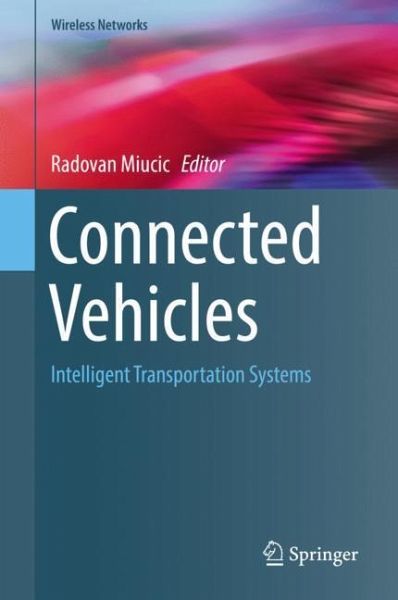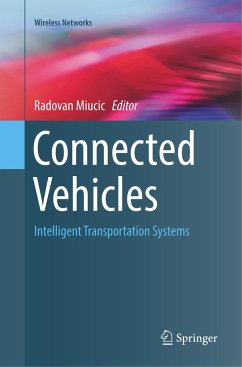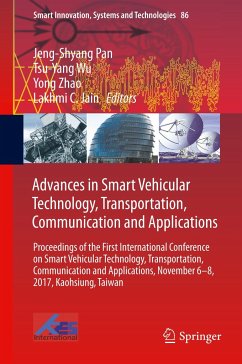
Connected Vehicles
Intelligent Transportation Systems
Herausgegeben: Miucic, Radovan

PAYBACK Punkte
61 °P sammeln!
This book introduces concepts and technologies of Intelligent Transportation Systems (ITS). It describes state of the art safety communication protocol called Dedicated Short Range Communication (DSRC), currently being considered for adoption by the USDOT and automotive industry in the US. However, the principles of this book are applicable even if the underlying physical layer protocol of V2X changes in the future, e.g. V2X changes from DSRC to cellular-based connectivity.Fundamental ITS concepts include topics like global positioning system; Vehicle to Vehicle (V2V), Vehicle to Pedestrian (V...
This book introduces concepts and technologies of Intelligent Transportation Systems (ITS). It describes state of the art safety communication protocol called Dedicated Short Range Communication (DSRC), currently being considered for adoption by the USDOT and automotive industry in the US. However, the principles of this book are applicable even if the underlying physical layer protocol of V2X changes in the future, e.g. V2X changes from DSRC to cellular-based connectivity.
Fundamental ITS concepts include topics like global positioning system; Vehicle to Vehicle (V2V), Vehicle to Pedestrian (V2P), and Vehicle to Infrastructure (V2I) communications; human-machine interface; and security and privacy. Fundamental concepts are sometimes followed by the real-life test experimental results (such as in V2P Chapter) and description of the performance metrics used to evaluate the results. This book also describes equations and math used in the development of the individual parts of the system.
This book surveys current and previous publications for trending research in the ITS domain. It also covers state of the art standards that are in place for the DSRC in the US, starting from the application layer defined in SAE J2735 all the way to physical layer defined in IEEE 802.11.
The authors provide a detailed discussion on what is needed to extend the current standards to accommodate future needs of the vehicle communications, such as needs for future autonomous vehicles. Programs and code examples accompany appropriate chapters, for example, after describing remote vehicle target classification function a pseudo code and description is provided. In addition, the book discusses current topics of the technology such as spectrum sharing, simulation, security, and privacy.
The intended audience for this book includes engineering graduate students, automotive professionals/engineers, researchers and technology enthusiasts.
Fundamental ITS concepts include topics like global positioning system; Vehicle to Vehicle (V2V), Vehicle to Pedestrian (V2P), and Vehicle to Infrastructure (V2I) communications; human-machine interface; and security and privacy. Fundamental concepts are sometimes followed by the real-life test experimental results (such as in V2P Chapter) and description of the performance metrics used to evaluate the results. This book also describes equations and math used in the development of the individual parts of the system.
This book surveys current and previous publications for trending research in the ITS domain. It also covers state of the art standards that are in place for the DSRC in the US, starting from the application layer defined in SAE J2735 all the way to physical layer defined in IEEE 802.11.
The authors provide a detailed discussion on what is needed to extend the current standards to accommodate future needs of the vehicle communications, such as needs for future autonomous vehicles. Programs and code examples accompany appropriate chapters, for example, after describing remote vehicle target classification function a pseudo code and description is provided. In addition, the book discusses current topics of the technology such as spectrum sharing, simulation, security, and privacy.
The intended audience for this book includes engineering graduate students, automotive professionals/engineers, researchers and technology enthusiasts.












